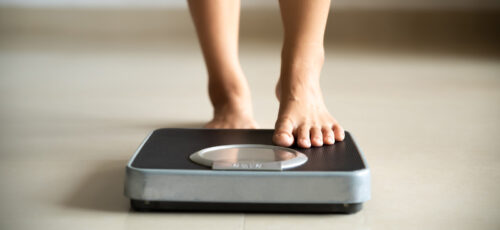
By: Ashley Mateo
This article was originally published on Paceline.

Much like managing your finances, so much of maintaining a healthy lifestyle comes down to the numbers: How many hours of sleep did you get? How many calories did you eat? How much physical activity did you fit into your day? When those numbers aren’t balanced, it can throw your body—and your wellbeing—out of whack.
That doesn’t mean you need to be obsessively tracking certain biomarkers, but staying on top of your general habits—and out of “debt”—when it comes to sleep, nutrition, and movement can help you avoid all kinds of negative health outcomes. Here’s how.

Fitness Debt
What it is: You should be logging at least 150 minutes per week (or 130 hours per year) of physical activity, according to the Centers for Disease Control and Prevention (CDC). But the average American performs just 115.1 hours of training per year, meaning they’re racking up a “fitness debt,” according to a survey by Barbend.com. And per the CDC, only about a quarter of U.S. adults hit that 150-minute mark and met federal guidelines for muscle-strengthening activities in 2020. ICYMI, the Paceline app incentivizes you to log that 150 minutes by offering free rewards in its dynamic marketplace. That could be deals on Hyperice products, freebies like a Liquid I.V. 3-pack, gift card giveaways to lululemon or Whole Foods, and more. Download the app here.
Why it matters: “Getting the recommended amount of physical activity is important because it strengthens the entire cardiovascular system (including the heart, arteries, and veins),” explains Todd Buckingham, PhD, chief exercise physiologist at The Bucking Fit Life in Atlanta, Georgia. “This means that the heart can pump more blood with less effort and the blood can be transported throughout your body more easily, which reduces your risk of cardiovascular disease [and] helps to control your blood pressure. Regular physical activity can help control body weight, cholesterol, and blood sugar levels.”
But just because you work out doesn’t mean you’re exempt from the effects of sitting too much before and after your workouts. People who take less than 5,000 steps per day are setting themselves up for “exercise resistance,” a scenario where the fat metabolism processes triggered by exercise won’t occur because your daily activity level is too low, a February 2021 study published in Medicine & Science in Sports & Exercise found.
How to fix it: The key is consistent movement. Aim to get up and walk around for a few minutes at least once an hour (most fitness trackers will remind you!), and move intentionally every day—even if it’s just 10 minutes, Buckingham suggests. “Once a habit of 10 minutes per day is established, that 10 minutes is likely to turn into 15 or 20 minutes which means the benefits will be even greater,” he adds. “The key is to start small. It’s much easier to convince yourself to get out for a 10-minute walk than it is to go for a five-mile run. Setting realistic goals will help keep you motivated and reduce your risk of injury.”

Sleep Debt
What it is: Sleep debt is when the amount of sleep you’re getting is less than the amount of sleep you need, says W. Christopher Winter, MD, author of The Rested Child and a sleep specialist and neurologist in Charlottesville, Virginia. And it’s cumulative—meaning even going to sleep 30 or 60 minutes later than usual for a few days can quickly add up, according to Sleep Foundation. Considering up to 50 percent of Americans suffer from insomnia symptoms each year, per the Cleveland Clinic, that’s a big problem.
Why it matters: “Sleep deprivation has massively negative effects,” says Winter. “It is a huge risk factor for dementia and cognitive decline, as well as weight gain and even death.” That’s because sleep is absolutely essential to survival; it’s when your body repairs and restores itself in order to function at 100 percent. Most adults need seven to nine hours of sleep per night, according to guidelines from the National Sleep Foundation—and, physiologically, it can take up to four days to recover from just one hour of lost sleep and up to nine days to eliminate sleep debt, according to research in the journal Scientific Reports.
How to fix it: Don’t freak out if you have one bad night. As long as you make up for it within a week, you likely won’t have to deal with any scary long-term effects. (For more on how to catch up on sleep, see this article from Sleep Foundation.) But “the goal should always be adequate sleep—prioritize sleep like you would prioritize BTS Farewell Concert tickets,” Winter says. Do that by focusing on better sleep hygiene: having consistent bed and wake times, creating a sleep environment that’s conducive to quality shuteye (dark, cool, and free of distractions), and avoiding caffeine, alcohol, and too much screen time before bed.

Nutrition Debt
What it is: Sometimes people get so worried about whether they’re overindulging that they overlook one of the biggest issues that can inhibit fitness performance: undereating. Women ages 19 to 30 require about 1,800 to 2,400 calories a day, while men need about 2,400 to 3,000 a day, according to the current Dietary Guidelines for Americans; for those ages 31 through 59, most women require about 1,600 to 2,200 calories a day and men about 2,200 to 3,000 calories a day.
Why it matters: When you burn more calories than you consume, that’s called a calorie deficit. Done smartly, that can lead to healthy weight loss. But the accumulation of deficit leads to debt. When you’re consistently under-fueled—especially if you’re doing lots of exercise—“your body will start to recognize that it’s not getting enough energy to support basic life functions as well as exercise,” says Laura Asbury, a registered dietitian in Denver, Colorado. It then enters a ‘catabolic’ state, AKA a state of breakdown, where your body will actually burn its own muscle tissue for fuel over fat or glucose because it’s in starvation mode.
What does that mean for fitness? Low energy availability—when the calorie intake of an athlete is insufficient to meet the energy demands for daily life functions and to support the demands of exercise and training—could cause “fatigue, decreased endurance, decreased strength, poor recovery, irritability, decreased coordination and concentration, poor mental health, nutrient deficiencies, increased risk for injury and illnesses, [and] loss of menstrual cycle in females,” says Asbury.
How to fix it: Make sure you’re eating enough! Calorie counting for weight loss can be restrictive, but if you’re trying to eat more, it can actually help. “Everyone has a resting metabolic rate that is essentially your body’s energy needs for survival,” says Asbury. So, for your brain, organs, muscles, digestive system, and more to function properly, your body needs around 1,500 calories per day (depending on your age, height, weight, gender, and genetics). “We have to add on calories on top of that to account for non-exercise activities like walking around the house, cooking dinner, even breaking down your food,” says Asbury. “Finally, you have to account for the calories expended during exercise.”
Crunch promotes a culture of positivity, inclusivity, and fun with no judgments by providing an environment for all individuals regardless of their health and fitness goals. Find a Crunch gym near you to try our free trial membership, or join Crunch now. We’re here for you – at the gym or at home. Access the best live & on-demand workouts anytime, anywhere with Crunch+. Ready to get sweaty? Try hundreds of workouts for free! Start your free trial now!










































































































































































































